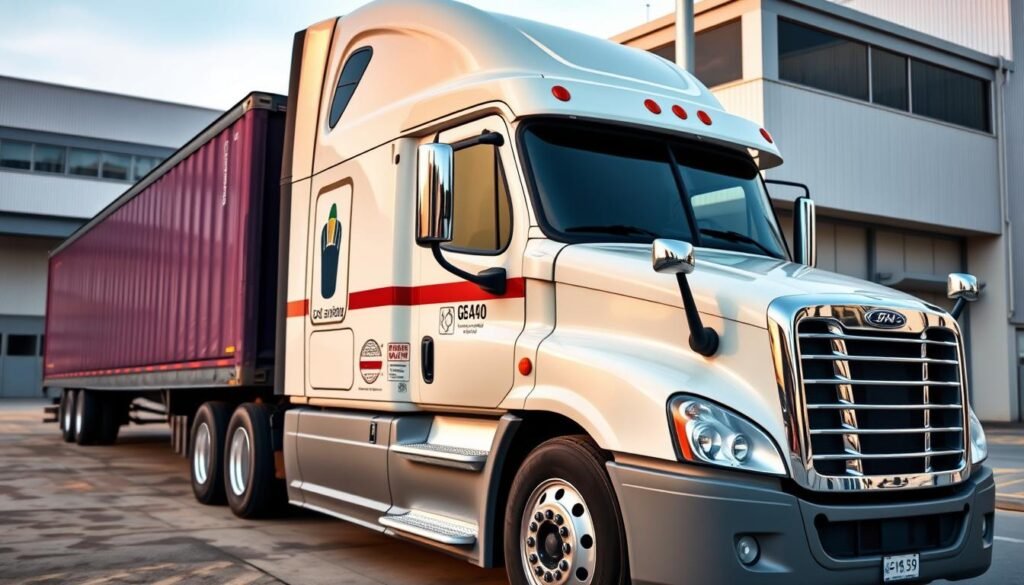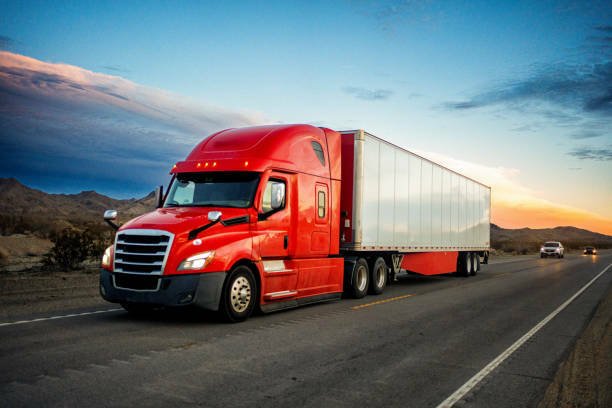Do you really know what a regulator or shipper will ask for before you sign a load?
You need coverage that meets federal and state minimums and fits how you run your business. That means thinking about where you operate, what you haul, and who drives. It also means checking filings, endorsements, and liability limits so you avoid fines or delays.
Top carriers like Progressive, GEICO, and Sentry offer specialized programs, fast quotes, and claims teams that keep trucks moving. Use those strengths to reduce downtime and protect revenue.
Later we outline mandatory versus optional protection, how bobtail and non‑trucking liability work, and the documents to bind a policy quickly. By the end, you’ll know which details regulators, brokers, and shippers expect before you load.
Key Takeaways
- Match your policy to daily operations to avoid fines or shutdowns.
- Distinguish legal minimums from optional protection that reduces business risk.
- Leverage carriers with trucking claims and network shops to limit downtime.
- Confirm filings, endorsements, and liability limits before you accept loads.
- Prepare required documents to bind coverage fast and keep authority active.
Why legal compliance matters for your trucking business
Meeting legal requirements stops interruptions and preserves the contracts that keep your business running.
Federal and state rules make coverage and filings non‑negotiable. The FMCSA requires financial responsibility endorsements before you haul interstate. States may add their own filings and limits, so your policy must match where you operate.
Filings act as formal proof for regulators, shippers, and ports. Without them, your authority can be delayed, loads can be held, and cargo release may stall. That harms margins and customer trust.
Carriers that submit filings fast give you an edge. Progressive and GEICO typically complete state and federal filings within 24–48 hours after you bind a policy and file for authority. That speed helps you get on the road sooner.
- Maintain required liability limits to avoid fines and out‑of‑service orders.
- Align policy endorsements to each state where you operate.
- Use carriers with years of trucking experience to reduce filing errors.

| Requirement | Why it matters | Typical turnaround |
|---|---|---|
| FMCSA financial endorsement | Proof of interstate liability to avoid authority delays | 24–48 hours |
| State filings | Local compliance for pickups, deliveries, and cargo movement | 24–48 hours (varies by state) |
| Broker/shipper evidence | Required to accept loads and protect business relationships | Immediate once filings are processed |
Truck Insurance
Choosing the right cover starts with matching limits and endorsements to how you operate.
Your policy must reflect vehicle type, lanes, and cargo. That ensures the commercial truck insurance you buy meets broker and regulatory demands without paying for unnecessary extras.
Progressive offers flexible payment and coverage options plus heavy‑truck claims teams and network repair shops. GEICO customizes policies for dry vans, reefers, flatbeds, and auto haulers while providing licensed specialists and strong financial ratings.

Make sure your policy names covered autos, drivers, and garaging locations so insurance cover responds as expected at claim time. If you run multiple units, use commercial auto and fleet tools to add vehicles and manage certificates fast.
- Pick a company with trucking specialists who can translate your insurance needs into the right endorsements and filings.
- Prioritize providers with strong claims services and network shops to help get you back on the road quickly.
- Confirm filings and territory coverage before you accept time‑sensitive loads.
| Feature | Why it matters | Provider example |
|---|---|---|
| Flexible payments | Helps cash flow during slow seasons | Progressive |
| Specialized policy types | Matches dry vans, reefers, and flatbeds to risk | GEICO |
| Claims and network shops | Faster repairs and less downtime | Progressive & GEICO |
Who needs commercial truck coverage and when you’re required to carry it
Knowing when you must carry commercial coverage keeps your authority active and prevents costly delays.
If you operate under your own authority, leased to a motor carrier, or run trucks for a private business, coverage rules change. GEICO notes owner‑operators with their own authority need commercial truck insurance that meets federal and state minimums before hauling. Filings are required for many interstate operations and are typically completed within 24–48 hours by GEICO or Progressive after you bind a policy and file for authority.
Owner-operators with their own authority
If you run under your own authority, you must carry limits that satisfy federal and state regulators. Submit filings before you haul so brokers and ports accept your certificates.
Owner-operators under permanent lease to a motor carrier
When you’re leased to a motor carrier, the carrier often provides primary liability while you’re dispatched. You still may need a truck insurance policy for physical damage, gap coverage, and downtime.
Private carriers and businesses that rely on trucks
Private carriers that move their own goods — like farmers or manufacturers — must cover third‑party injuries and property damage and protect their units from physical loss.
- Verify what the motor carrier’s policy covers versus your obligations for deductibles and cargo.
- Ask for written terms that clarify non‑trucking liability and bobtail when off‑dispatch.
- Keep lease contracts ready when you request quotes and file early to avoid authority delays.
Mandatory and optional coverages that help you stay compliant and protected
Your policy mix should cover required liability limits and add protections that guard revenue when things go wrong.
Start by confirming primary liability meets FMCSA and state limits. That core liability insurance satisfies financial responsibility and lets you operate legally. Check lease terms so you avoid gaps when a motor carrier provides primary limits while you’re dispatched.
Add motor truck cargo to protect freight from covered perils. Pair that with refrigeration breakdown if you haul temperature‑sensitive loads. GEICO lists motor truck cargo, refrigeration breakdown, and trailer interchange among its options.
Consider general liability for yard and premises exposures. Hired and non‑owned auto extends liability when you rent or borrow vehicles. Physical damage (comprehensive and collision) protects your tractors and straight units. Progressive provides heavy truck roadside assistance with towing; GEICO’s towing applies after a covered comp/collision loss.
- Confirm endorsements and deductibles match broker and shipper demands.
- Schedule all units and garaging locations to avoid coverage disputes.
- Review exclusions for temperature control and special commodities.
| Coverage | When to use | Why it matters | Provider example |
|---|---|---|---|
| Primary liability | Any operation hauling loads | Meets FMCSA/state limits to keep authority active | Progressive / GEICO |
| Motor truck cargo | Hauling third‑party freight | Protects cargo value and claims for loss or damage | GEICO |
| Refrigeration breakdown | Temperature‑controlled lanes | Covers spoilage and refrigeration system failure | GEICO |
| Roadside & towing | Long routes, heavy equipment | Reduces downtime with towing and on‑road service | Progressive |
Filings and authorities you may need to operate legally
Before you haul, make sure filings and authority align with your operating footprint and coverage limits.
Federal and state filings prove you meet financial responsibility and cargo minimums. The FMCSA requires a financial responsibility endorsement before interstate authority becomes active. Carriers like Progressive and GEICO typically issue federal and state filings within 24–48 hours after you purchase a policy and request authority.
FMCSA federal filings and financial responsibility endorsements
FMCSA filings document your financial responsibility and are required before authority is active for interstate operations. These endorsements show regulators you carry the right limits for liability and motor carrier obligations.
State-specific filings and handling
Many states require separate filings. Your company should manage multi‑state requirements so you can pick up and deliver without holds.
Turnaround times and triggers for filings
Filings are triggered when you buy a policy, request authority, add new operating areas, or change equipment. Typical turnaround is 24–48 hours; plan dispatch accordingly.
- Keep policy numbers, VINs, and garaging addresses handy to speed corrections.
- Notify your agent when you add a truck so filings match fleet data.
- Ask the carrier to monitor renewals so authority stays active through transitions.
- Train truckers and dispatch not to haul until filings show live in FMCSA/state systems.
| Filing type | Why it matters | Typical turnaround |
|---|---|---|
| FMCSA financial endorsement | Required for interstate authority; proves liability limits | 24–48 hours |
| State proof of coverage | Local compliance for pickups or deliveries | 24–48 hours (varies) |
| Cargo filings | Shows cargo minimums when shippers or contracts demand | Same day to 48 hours |
| Fleet updates | Keeps VINs, garaging, and named insured accurate | 24–48 hours |
Personal use, bobtail, and non-trucking liability explained
Knowing when a trip stops being business and starts being personal prevents costly coverage gaps. Define that line so you know when your insurance policy responds and when you need supplemental protections.
When business use ends and personal use begins
Personal use starts when a driver is not performing revenue work or acting under dispatch. Examples include grocery runs, sightseeing, or running errands off duty.
If you run under your own authority, your core policy may already cover personal use in specific situations. Still, validate the details so you avoid gaps if a loss occurs.
Bobtail coverage versus non-trucking liability
Bobtail applies when you operate the power unit without a trailer for a business purpose, such as returning to a terminal after dropping a load. Progressive explains this fills a gap when the unit is moving for work but not hauling a trailer.
Non-trucking liability insurance protects permanently leased owner-operators when the covered vehicle is used solely for personal, non-revenue purposes. GEICO notes leased motor drivers typically need this to cover personal trips that the carrier’s primary policy does not.
- Ask your agent to document cover personal use provisions and exclusions in endorsements.
- Clarify with dispatch and train drivers when a trip is “under dispatch” to prevent disputes.
- Keep trip sheets and logs to prove intent if a claim questions business versus personal use.
- Confirm who is responsible for physical damage and non-trucking on a leased motor before you sign.
How much commercial truck insurance costs right now
Premiums vary widely across fleets, so expect your monthly spend to reflect where and how you operate.
Use national averages as a budget guide, not a final quote. Progressive’s 2024 national averages run roughly $746 to $954 per month for for‑hire operations. GEICO notes that inspection history and selected coverages also move rates up or down.
Key pricing factors: USDOT compliance, cargo, vehicle type, radius, and history
Major rating inputs include USDOT authority status, liability limits, and the class and condition of your truck or trailer.
Cargo types, motor truck cargo endorsements, lanes served, garaging location, and driver MVRs or inspection records all affect the final premium.
What national averages can and can’t tell you
National figures help budget, but a bindable quote requires VINs, drivers, and operations. Work with carriers that use telematics and safety credits to seek savings at renewal.
| Metric | Example impact | Source |
|---|---|---|
| Monthly average | $746–$954 | Progressive 2024 |
| Driver history | Can raise premium significantly | GEICO / carrier data |
| Coverage add‑ons | Motor truck cargo, phys. damage | Rates vary by selection |
Ways to save without risking compliance gaps
Smart savings come from programs that reward safe driving and from design choices that trim premium without trimming protection.
Leverage telematics and discounts. Progressive’s Smart Haul and Snapshot ProView give measurable savings for fleets that share ELD data. New Smart Haul participants save an average of $1,056; Snapshot ProView can cut rates by about 6% and adds fleet tools for three or more vehicles.
Design your policy to control costs. Bundle coverages with GEICO’s multi‑policy credits, and pursue five‑year accident‑free or military discounts when eligible. Right‑size deductibles so you balance cash flow with required limits.
- Use commercial auto tools and fleet management to monitor drivers and reduce claims.
- Keep filings and certificates current; lapses raise renewal costs and can halt loads.
- Remove idle units and update garaging to match actual exposure.
- Standardize safety training and document maintenance to improve loss history.
- Schedule quarterly reviews with your company rep to adjust options and endorsements.
Engage drivers. Safety incentives and consistent coaching can lower risk over years and help get better pricing for your business.
Claims handling, network shops, and support you can count on
A strong claims network pairs 24/7 adjusters with priority repair shops to shorten downtime. When you report a loss, rapid response matters. Quick action reduces days out of service and limits extra costs.
Choose carriers that keep claims teams in‑house and staffed with heavy‑unit specialists. Progressive provides 24/7 heavy truck adjusters and gives customers priority at network shops. Sentry keeps all adjusters in‑house and uses trucking‑specialist agencies. GEICO backs service with A++ strength and online account tools.
- Pick a company with round‑the‑clock heavy‑unit claims to get help any hour.
- Network shops with priority status cut repair time and protect unit integrity.
- In‑house adjusters know complex losses like cargo contamination and frame repair.
- Clear communication, digital tools, and reserve management protect cash flow.
- Ask about OEM vs aftermarket parts policies and how the carrier handles subrogation and tow coordination.
Post‑loss reviews and strong financial backing help you recover and reduce future claims. Make sure coverage details and endorsements are visible to the claims team for faster approvals so your drivers and business get moving again.
Choosing a truck insurance company you can trust
Pick a carrier that blends deep trucking know‑how with the financial reserves to pay complex claims fast.
Specialized trucking expertise and financial strength
You need an insurer with proven stability and sector experience. GEICO holds an A++ A.M. Best rating and has about 85 years in the market. Progressive is the top commercial truck carrier in the U.S. with more than 50 years serving fleets. Sentry keeps claims in‑house and works only with trucking‑specialist agencies.
Those credentials matter when a large liability or cargo claim arises. Strong ratings and years of service reduce the risk of unpaid or delayed settlements.
Coverage breadth, filings support, and fleet management tools
Look for broad coverage options including cargo insurance, hired/non‑owned, general liability, and motor truck endorsements. Confirm the carrier submits multi‑state filings quickly so your operations stay legal.
Also verify online fleet tools for ID cards, vehicle changes, and driver updates. Fast filings and clear policy wording save time and keep loads moving.
- Prioritize trucking industry expertise and financial strength.
- Evaluate liability limits, surplus lines access, and endorsement options.
- Choose partners with years serving motor carriers and leased motor owner‑operators.
- Confirm loss control resources and adjuster knowledge of truck cargo and refrigeration repairs.
| Carrier | Strength | Support |
|---|---|---|
| GEICO | A++ rating; 85 years | Filing support; fleet tools |
| Progressive | #1 commercial truck carrier; 50+ years | Fast filings; heavy‑unit claims |
| Sentry | In‑house claims; trucking specialists | Specialist agency support; tailored loss control |
Get covered fast and stay on the road
A quick quote starts with organized fleet and driver data ready to submit online. Have the essentials in hand so agents can produce a bindable rate and prepare filings without delay.
What to have ready for a quote
Gather VINs, driver MVRs, loss runs, garaging addresses, cargo details, and DOT/MC numbers. These items help get accurate quotes and speed credentialing with brokers.
- Operating radius and lane descriptions to match limits to your use.
- Recent loss runs and driver records to avoid rate surprises.
- Clarify personal use and off‑dispatch movements to place correct endorsements.
Binding coverage and issuing filings quickly
Bind the truck insurance policy once terms meet your needs. Progressive can deliver online quotes in as little as eight minutes and typically completes filings within 48 hours.
GEICO may provide immediate coverage and files federal FMCSA endorsements and state filings within 24–48 hours after you purchase and request authority.
| Step | Why it matters | Expected turnaround |
|---|---|---|
| Submit VINs & drivers | Enables accurate premiums and VIN‑level filings | Same day to 24 hours |
| Bind policy & request filings | Triggers FMCSA and state endorsements to show proof of coverage | 24–48 hours |
| Request ID cards & COIs | Needed for brokers, load boards, and onboarding | Immediate to same day |
Final tips: Use commercial auto portals to add units or drivers, confirm effective dates to avoid gaps, and schedule a 30–60 day prerenewal review to update equipment lists and exposure. Keep records organized so future filings, audits, and claims proceed smoothly.
Conclusion
Use what you’ve learned to lock in truck insurance that keeps operations legal and minimizes downtime.
Confirm filings and endorsements first. Verify liability, cargo, and physical damage cover so your policy responds when you need it.
Progressive and GEICO provide fast filings and trucking specialists. Sentry emphasizes in‑house adjusters and specialist agencies. Progressive’s 2024 monthly averages ran about $746–$954, but your exposure sets the final price.
Keep equipment lists, driver records, and certificates current. Use telematics and safety programs to control claims and protect business continuity.
When you’re ready, gather VINs, MVRs, loss runs, and routes, then request quotes to bind coverage and keep trucks moving with confidence.


